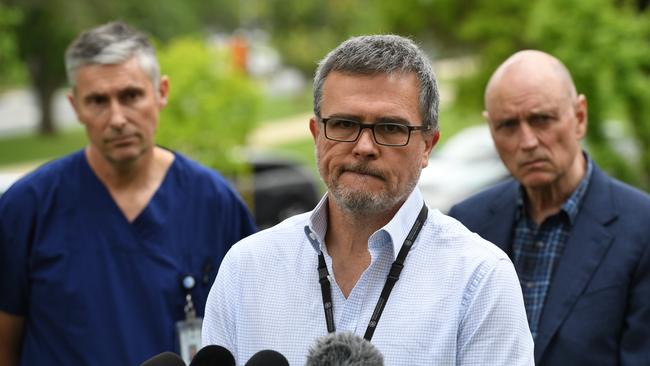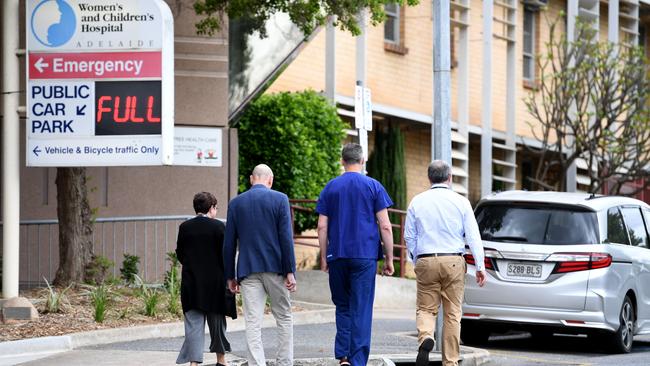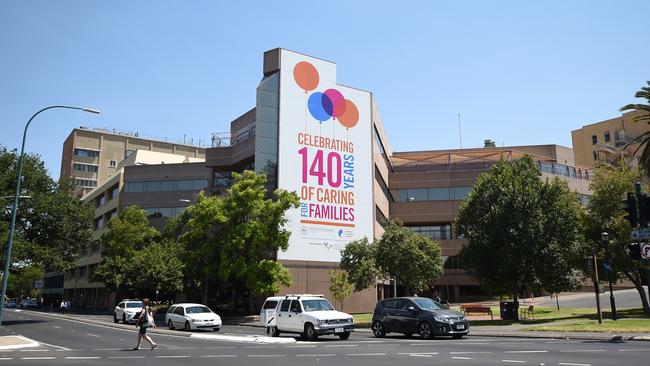Women’s and Children’s Hospital won’t get babies’ cardiac surgery, but is set to get heart-lung surgery bypass service
The WCH is set to get a new heart-lung machine for babies – as it’s revealed who stopped flights to Melbourne for cardiac surgery.
SA News
Don't miss out on the headlines from SA News. Followed categories will be added to My News.
Paediatric heart surgery at the Women’s and Children’s Hospital should not be reintroduced, a new report concludes, but it should get a heart-lung bypass service known as ECMO (cardiac oxygen service).
The independent review by senior clinicians supported the findings of a separate independent review, which in August concluded case numbers were too low to maintain a safe service. Children will instead continue to be flown interstate for surgery.
The review of the first review estimated case numbers would be around 50 a year, even lower than the first report’s estimate of 70 to 110 a year.
“We do not see that such a program would be either sustainable in the long term or reliably able to provide excellent quality of care and outcomes,” the second opinion report states.
It says a “single surgeon” model is unsustainable, and while it could work for a while “the risks of failure would be high”.

“It would be difficult to justify the establishment of a low-volume unit based on a single paediatric cardiac surgeon in Adelaide,” it states.
It says an ECMO service should be established but notes the initial review’s estimate of 10-20 cases annually “to be optimistic and most likely unrealistic”.
WCH chief executive Lindsey Gough said because there was some disagreement about the first review the hospital board commissioned a second opinion.
“That second opinion fully supports the recommendation of the first review that the paediatric cardiac surgery service should remain at the Royal Children’s in Melbourne and we should explore an ECMO service here in South Australia,” she said.
The WCH board will consider the report at its meeting next week before a formal decision is taken.
Last week it was revealed in a bombshell report that reports on four babies’ deaths were rejected over a technicality.
The second review was signed by three senior paediatricians - one from Brisbane and two from New Zealand, including paediatric cardiologist Dr Tom Gentles, chair of the Paediatric and Congenital Council of the Cardiac Society of Australia and New Zealand.
They were asked to check the initial independent review after it was revealed four babies had died at the WCH in four weeks, linked by some to the lack of a cardiac surgery unit and the decision to stop retrieval flights to Melbourne for surgery due to COVID and instead divert patients to Sydney.
This reignited calls for a cardiac surgery unit at the WCH, which ceased in 2002 due to low case numbers.
WCHN Medical Director of Paediatric Medicine and senior cardiologist, Dr Gavin Wheaton, revealed chief public health officer Professor Nicola Spurrier and deputy chief public health officer Dr Evan Everest had been consulted about the decision to stop flying children to Melbourne.

“I’m very confident it was the right decision,” he said. “I don’t believe the lack of a local surgical service did have any significant impact on the unfortunate deaths of those babies, but we should not pre-empt the outcome of the formal review.”
He said children needing surgery are still being flown to Sydney and discussions are being held with Melbourne to resume the service.
“We guarantee (to parents) their children will have ready access to high-quality surgical services whether that be in Sydney or Melbourne, that is our undertaking to families and we give them absolute assurance,” Dr Wheaton said.
“We have ready access, if an operation needs to happen today or tomorrow, that’s when it will happen. We certainly have not had any problems with excessive waits for surgery in either Sydney or Melbourne.”

Respected obstetrician and convener of the WCH Alliance Associate Professor John Svigos told a parliamentary committee an ECMO service without a cardiac surgeon was dangerous due to the high risks of the treatment which can trigger the need for emergency surgery.
However, Dr Wheaton said options for an ECMO service were being checked including having one available to put children on briefly while an interstate transfer is being organised.
“I believe it would be safe,” he said.
The WCH Alliance is considering the report and expects to make a public statement this week.
As public debate on the issue grows a dozen senior WCH clinicians including heads of units signed an open letter opposing establishment of a heart surgery unit unless it can be proven to be safer than the current system of transferring patients interstate.
The recent infant deaths have been referred to the Coroner and a review is expected to take four weeks.



